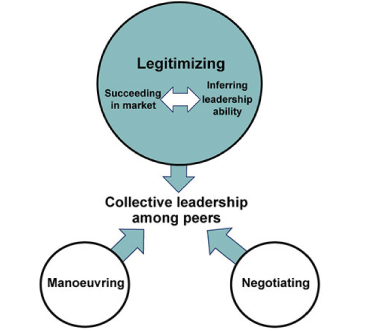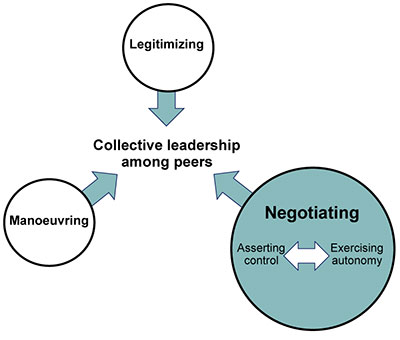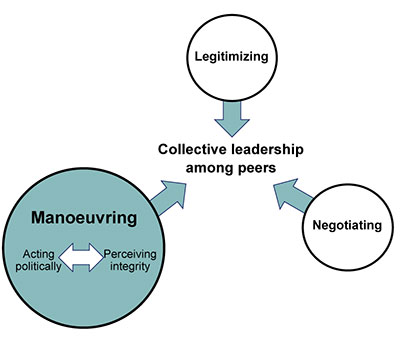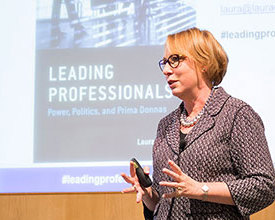How does leadership actually happen among professional peers? The answer is: collectively.
In conventional corporate settings, leaders are expected to inspire and direct their employees—leading is something they do to followers rather than with colleagues. But in professional service firms the leadership dynamics are different, because the power relationships are different.
Senior professionals do not easily accept the role of follower—and may be just as unwilling to act as leaders. In this context, leadership is a collective, not an individual, endeavour, created through interactions among powerful peers.

Understanding three dynamics
Through my keynote speeches, leadership offsites, and advisory work, I help professionals to understand and overcome the leadership challenges within their organizations.
The first step is to understand the three distinct yet interconnected dynamics I have identified through my research — establishing legitimacy, negotiating perpetually, and manoeuvring politically. Together they help explain how collective leadership actually happens among professionals.
And once you understand these three dynamics, you can start to see how collective leadership in professional organizations is inherently unstable.
Establishing legitimacy
Among professionals, legitimacy as a leader ultimately depends on your ability to win new business and manage key client relationships. If colleagues see you as a role model, they will be willing to cede authority to you — even if you have no proven talent for leadership.
Yet many professionals have very little interest in becoming leaders. They want to focus on what they love best — their client work — and are reluctant to put themselves forward as potential leaders. How should professionals identify the best potential leaders if the people they want to follow are not necessarily willing or able to lead them?


Negotiating perpetually
Striking a balance between exercising autonomy and asserting control is far from easy. Knowing what actions to take is only part of the challenge. You need to understand when to take them, with whom, and how to persuade your colleagues to follow.
For example, colleagues may view your attempts to assert control as an unacceptable infringement on their autonomy. But if you leave it too long, they may complain about a “leadership vacuum.” How should professionals walk this tightrope, and persuade colleagues to follow their lead?
Manoeuvring politically
Political behaviours are rife within professional service firms. It is how leaders create and sustain consensus among peers. To get anything done, leaders need to draw upon four core political skills: networking ability, interpersonal influence, social astuteness, and apparent sincerity.
Professionals distrust colleagues who seem to want power over them. So leaders need to convince colleagues that they are employing their political skills for the collective benefit rather than their own. How do professionals act politically without getting a reputation for being “political”?

An unstable equilibrium
These three dynamics — establishing legitimacy, negotiating perpetually, and manoeuvring politically—are in constant tension. As a result, they are inherently unstable. This is why so many leaders of professional organizations get into difficulties, particularly when they are first starting out. It’s not just about what you do as an individual leader but how your colleagues interpret and respond to what you are doing.
The leadership team of a professional service firm in effect includes all the partners. The most senior leaders need to keep reflecting the leadership challenge back onto them—it is important to keep reminding them and yourself that leadership is a collective activity.
Further resources
Other specialist subjects
Laura offers advisory consultations and keynote speeches which draw upon her 30 years of academic research to help professional organizations navigate their most pressing challenges. Here is a selection of the subjects she covers.
Power of partnership
Realizing the individual and collective potential within professional service firms.
Find Out More


